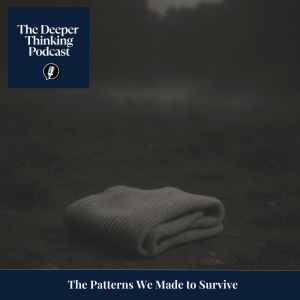
Thursday May 01, 2025
The Patterns We Made to Survive - The Deeper Thinking Podcast
The Patterns We Made to Survive
The Deeper Thinking Podcast
What if the habits you now resent were once the very strategies that kept you safe? In this episode, we explore how emotional survival strategies—like perfectionism, dissociation, or compulsive care for others—begin as intelligent responses to fear, chaos, or invisibility. But what happens when they outlive their purpose? When the same patterns that protected us become the ones that keep us distant, small, or exhausted?
This is not an essay about transformation as triumph. It is a meditation on return—on meeting the younger self who built those patterns, not with critique, but with companionship. With quiet references to Donald Winnicott, Bessel van der Kolk, Judith Herman, and Melanie Klein, we explore therapy not as cure, but as the slow undoing of shame, the repatriation of grief, and the gentle practice of coherence in place of performance.
What if your sadness made sense? What if your reflex to withdraw was once wisdom? And what if healing isn’t about becoming someone new—but about becoming someone less edited, more met, more whole? This episode isn’t a solution. It’s a small, spacious field where permission lives. A place where presence replaces perfection, and the self is welcomed, not fixed.
Why Listen?
- Reframe self-sabotage and grief as intelligent adaptations, not dysfunction
- Explore therapy as a relational, non-performative act of emotional repair
- Engage with contemporary psychoanalytic and relational theory without jargon
- Experience a spacious, gently recursive reflection on the long arc of healing
Listen On:
Bibliography
- Winnicott, Donald. The Maturational Processes and the Facilitating Environment. Hogarth Press, 1965.
- Herman, Judith. Trauma and Recovery. Basic Books, 1992.
- van der Kolk, Bessel. The Body Keeps the Score. Viking, 2014.
- Klein, Melanie. Envy and Gratitude. Tavistock, 1957.
- Laing, R.D. The Divided Self. Penguin, 1960.
- Gilligan, Carol. In a Different Voice. Harvard University Press, 1982.
Bibliography Relevance
- Donald Winnicott introduces the concept of the “true self” protected beneath compliance—supporting the essay’s motif of invisible survival logic.
- Judith Herman reframes trauma as a structural reality, grounding the essay’s recursive grief arc.
- Bessel van der Kolk reveals how the body archives what the mind cannot narrate—echoing the physicality of dissociation and reflex.
- Melanie Klein offers insights into ambivalence, envy, and projection—aligning with the essay’s ethical ambiguity around healing and resentment.
- R.D. Laing explores fractured identity in systems of control—mirroring the internal division of the adapted self.
- Carol Gilligan reframes moral development through relational voice—affirming the essay’s central ethic of listening over solving.
#SelfSabotage #GriefAndHealing #TherapyAsReturn #Winnicott #VanDerKolk #Klein #EmotionalRepair #RelationalTrauma #TheDeeperThinkingPodcast
No comments yet. Be the first to say something!